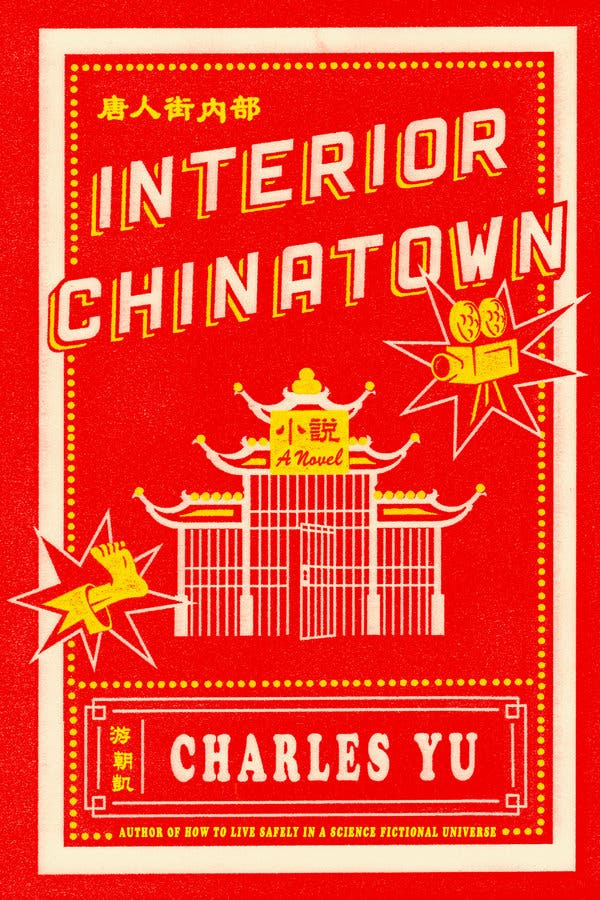INTERIOR CHINATOWN
By Charles Yu
Over the past 15 years, Charles Yu has carved out a fascinating, eclectic career as a storyteller, first receiving widespread acclaim in 2010 for his novel “How to Live Safely in a Science Fictional Universe,” which showcased his ability to revitalize familiar tropes like time travel. This talent has only escalated in his writing for visionary TV shows like “Westworld,” “Legion” and “Lodge 49.” In his new novel, “Interior Chinatown,” Yu expands upon this approach in brilliant and unexpected ways.
“Interior Chinatown” posits that we are reading a teleplay about Chinatown — specifically the Golden Palace restaurant, which is the setting for a cop show called “Black and White.” Through his protagonist, Willis Wu — who has a small part on the show — Yu explores in devastating (and darkly hilarious) fashion Hollywood’s penchant for promoting clichés about Asians and Asian-Americans. Wu has worked his way from “Background Oriental Male” to “Dead Asian Man” to “Generic Asian Man Number Three/Delivery Guy” — a long way from “Kung Fu Guy,” which is where he wants to be.
Although the lacerating humor in “Interior Chinatown” never skips a beat, what makes the novel so compelling is its strong commitment to characterization, without which the pointed commentary would be less potent. (Yu’s work here, in all its complexities and contradictions, conjures up favorable comparisons to Paul Beatty’s “The Sellout.”) Early on, we are given a meticulous portrait of Wu’s father, Sifu, once “a young dragon” and martial arts expert but now an “Old Asian Man” who would “always be your Father, but somehow was no longer your dad.” Wu helps care for Sifu, “checking for dampness on his mattress pad, changing it if necessary.” An undercurrent of anger and sadness fuels these scenes. It’s not so much that Wu is passive but that the author is so good at integrating his character’s point of view into what would be, in lesser hands, little more than scene description.

This portrait of Wu’s father is rendered even more poignant in a scene about white people making fun of Asian-Americans doing karaoke. Yu uses Sifu’s love of John Denver songs to deepen not just character but also understanding: “When he steps up and starts slaying ‘Country Roads,’ try not to laugh … because by the time he gets to ‘West Virginia, mountain mama’ you’re going to be singing along, and by the time he’s done you might understand why a 77-year-old guy from a tiny island in the Taiwan strait who’s been in a foreign country two-thirds of his life can nail a song, note perfect, about wanting to go home.”
Wu, in the meantime, dreams of bigger acting gigs, even though he feels he’s treated like Generic Asian Man in real life. He’s damaged, not just from enduring constant racism, but from the effort it takes to push back against stereotypes instead of give in to them, and it’s unclear if some of the things he describes have really happened or if he’s imagined them. The distinction soon becomes irrelevant, though. We may be reading a teleplay, but Wu, as its narrator and writer, enters the story as a character to interact with characters that exist on different levels of fictionality. Here Yu’s work on “Westworld” appears to have fed into his writing, given the clarity of these levels and the ways in which their intersection lifts up the novel.
[ How does Charles Yu organize his books? “Vertically, in a column next to my bed. … It’s not much of a system (and highly susceptible to gravity, my foot or my dog), but the only one I am organized enough to stick to.” ]
Throughout, too, as anchor against the danger of metafictional aspects evaporating into postmodern mist, Yu builds a lovely and detailed portrait of the Golden Palace building, where first- and second-generation immigrants live on the floors above the restaurant. A cracked shower pan on the ninth impacts the eighth in a way that allows us a useful glimpse of daily life, and these glimpses masterfully become plot over the course of the novel.
By the end of “Interior Chinatown,” our sense of the real changes once again and even karaoke returns in a fresh and beautiful way. For the current moment, in which whitewashing still extinguishes opportunity and supports the status quo — despite gains both on the screen and in writers’ rooms — Yu’s novel may seem topical. But it is so much more than that. “Interior Chinatown” represents yet another stellar destination in the journey of a sui generis author of seemingly limitless skill and ambition.
 EU News Digest Latest News & Updates
EU News Digest Latest News & Updates



